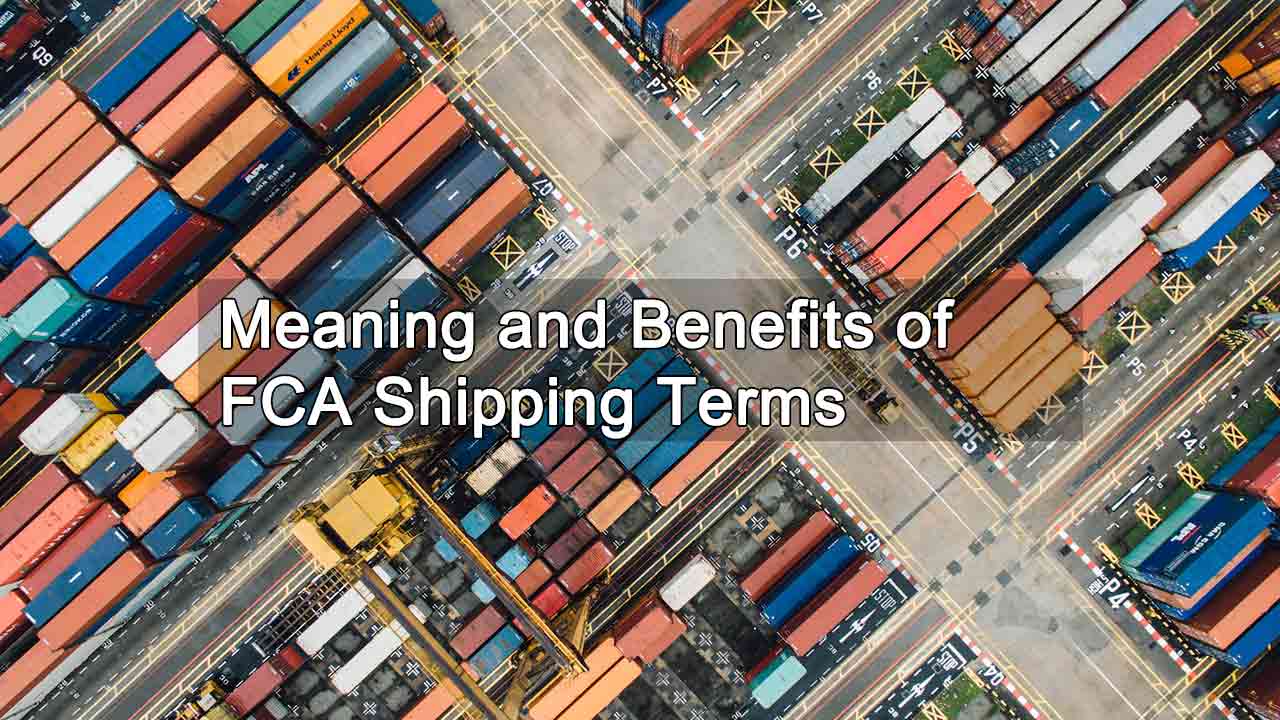Welcome to the exciting world of international trade and logistics! In today’s global marketplace, understanding shipping terms is vital for successful international trade. This article explores the importance of comprehending these terms and briefly overviews Incoterms and their significant role in global logistics. As we embark on this journey, our primary focus will be on FCA Incoterms, also known as Free Carrier Incoterms. We will delve into the intricacies of FCA shipping terms, unraveling their meaning and shedding light on their relevance in international trade. So, get ready to expand your knowledge and embrace the realm of seamless global commerce.

| Table of Content |
What are FCA Incoterms?
FCA Incoterms, also referred to as Free Carrier Incoterms or free carrier shipping terms, are a vital aspect of international trade that governs the responsibilities and obligations of buyers and sellers in the global logistics arena. Understanding FCA Incoterms is essential for businesses engaged in cross-border transactions to ensure seamless operations and successful delivery of goods. At its core, FCA signifies a shipping agreement where the seller fulfills their obligation by delivering the goods to a designated carrier or an agreed-upon location. This pivotal moment marks the transfer of risk and responsibility from the seller to the buyer during the shipping process. It provides clarity and sets the foundation for a smooth transaction between parties.
Buyers taking advantage of FCA shipping terms are entrusted with several key responsibilities once the goods are in their possession. They become responsible for organizing transportation, securing insurance coverage, and managing customs clearance. On the other hand, sellers must ensure proper packaging of the goods and prepare the necessary documentation to facilitate a seamless handover.
Opting for FCA shipping terms offers a range of benefits and considerations for businesses involved in international trade. Firstly, it provides flexibility in selecting the most suitable mode of transportation and carrier, allowing businesses to optimize costs and meet specific delivery requirements. This adaptability empowers companies to tailor their shipping methods according to the unique needs of their operations. Another advantage of utilizing FCA Incoterms is the clarity it brings to the transfer of risk and responsibility. By clearly defining these aspects, potential disputes and confusion are minimized, fostering smoother transactions and enhanced collaboration between buyers and sellers.
However, it is important to note that successfully implementing FCA shipping terms requires meticulous planning, coordination, and effective communication between parties. Clear agreements and proper documentation are crucial to ensure a seamless transition and avoid any potential pitfalls or misunderstandings.
By understanding FCA Incoterms and the implications they have on shipping logistics, businesses can navigate the complexities of global commerce with confidence. Embracing FCA shipping terms offers flexibility, clarity, and opportunities for cost optimization, ultimately leading to successful transactions and satisfied customers. So, whether you’re a seasoned player in the international trade arena or just venturing into global markets, comprehending FCA Incoterms is an indispensable asset for your business success.
Example of FCA Incoterms
Now that we have a solid understanding of FCA Incoterms, let’s explore a practical example to see how this shipping term operates in real-world scenarios.
Imagine you run a clothing business based in the United States, and you’ve received an order from a buyer in Germany. Under FCA Incoterms, your responsibility as the seller would be to ensure that the goods are ready for pickup at your designated location, which could be your warehouse or a specified loading point. Once the goods are prepared, you’ll coordinate with the carrier and arrange for their collection. In this scenario, let’s say you decide to engage a local shipping company to handle the transportation. The carrier arrives at your warehouse, and you provide them with the necessary documentation and assistance in loading the goods onto their truck. At this point, the risk and responsibility transfer to the buyer.
Now, the goods are en route to Germany. The buyer, as the importer, will take care of the transportation costs, insurance, and customs formalities upon arrival. This includes handling import duties, taxes, and clearance procedures to ensure a smooth entry into their country. By utilizing FCA Incoterms, you’ve allowed the buyer the flexibility to choose the most suitable transportation method and carrier for their needs. They have control over the logistics process once the goods are in their possession, giving them the opportunity to manage costs and ensure timely delivery to their destination.
It’s important to note that the specifics of each FCA agreement may vary depending on the negotiated terms between the buyer and seller. However, the fundamental principle remains the same—the transfer of risk and responsibility at the designated point.
Comparing FCA Incoterms: EXW vs. DDP
To gain a deeper understanding of FCA Incoterms, it’s important to distinguish them from other shipping terms. One such term is EXW, or Ex Works. While both FCA and EXW are commonly used in international trade, they have distinct characteristics and implications.
EXW represents a shipping agreement where the seller’s responsibility ends once the goods are made available at their premises. In this case, the buyer bears all risks and costs associated with transportation, insurance, and customs clearance from the seller’s location to the final destination.
On the other hand, FCA Incoterms involve the seller delivering the goods to a named carrier or another designated location. The seller takes care of the transportation arrangements and associated costs until the goods are handed over to the carrier. At that point, the buyer assumes responsibility for transportation, insurance, and customs clearance.
The key difference between FCA and EXW lies in the level of involvement and responsibility of the seller in the transportation process. With EXW, the seller has minimal obligations beyond making the goods available at their premises. In contrast, FCA requires the seller to arrange for transportation and ensure the goods are ready for collection by the carrier.
It’s important to consider your specific business needs and preferences when choosing between FCA and EXW. FCA offers more flexibility and control over transportation, while EXW places the burden of logistics entirely on the buyer.
Understanding the complexities of shipping logistics can be time-consuming and challenging. That’s where NextSmartShip Fulfillment comes in. As a valuable solution for your shipping needs, we offer comprehensive services to simplify and optimize your supply chain. With NextSmartShip Fulfillment, you can rely on our dedicated team to handle every aspect of your fulfillment process. From warehousing and inventory management to packing and shipping, we take care of it all. Our global network of warehouses ensures efficient order processing and fast delivery to your customers worldwide.
By integrating your online store with us, you can automate order imports, track inventory levels, and streamline your fulfillment operations. Our advanced technology and expertise help you save time, reduce costs, and enhance customer satisfaction.
Ready to take your shipping logistics to the next level? Discover how NextSmartShip Fulfillment can transform your business. Learn more about our services and success stories by visiting our blog post on FCA Incoterms. Make informed decisions, optimize your supply chain, and let us be your trusted fulfillment partner.
Conclusion
In conclusion, FCA Incoterms serve as a vital framework in international shipping, enabling buyers and sellers to establish clear responsibilities and facilitate smooth transactions. Understanding the intricacies of these trade terms is crucial for businesses engaged in global commerce to ensure successful operations and customer satisfaction. FCA Incoterms represent a shipping agreement where the seller delivers the goods to a designated carrier or location, transferring the risk and responsibility to the buyer. This trade arrangement offers flexibility, clarity, and opportunities for cost optimization, making it a preferred choice for many businesses in international trade.
As you navigate the complexities of global logistics, we recommend considering the valuable solution provided by NextSmartShip Fulfillment. Our comprehensive warehousing, packing, and shipping services ensure a seamless experience for your e-commerce business. Discover how NextSmartShip can streamline your operations and enhance customer satisfaction by visiting our website at NextSmartShip.
NextSmartShip is here to help you conquer the challenges of global logistics and achieve remarkable growth. Stay tuned and get ready to unlock the potential of your business in our next exciting article.



